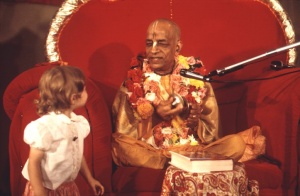CC Madhya 24.277 (1975)

A.C. Bhaktivedanta Swami Prabhupada
Below is the 1996 edition text, ready to be substituted with the 1975 one using the compile form.
TEXT 277
- dekhiyā vyādhera prema parvata-mahāmuni
- nāradere kahe,—tumi hao sparśa-maṇi
SYNONYMS
dekhiyā—seeing; vyādhera—of the hunter; prema—the ecstatic love; parvata-mahā-muni—the great sage Parvata Muni; nāradere kahe—spoke to Nārada Muni; tumi hao sparśa-maṇi—you are certainly a touchstone.
TRANSLATION
“When Parvata Muni saw the ecstatic loving symptoms of the hunter, he told Nārada, ‘Certainly you are a touchstone.’
PURPORT
When a touchstone touches iron, it turns the iron to gold. Parvata Muni called Nārada Muni a touchstone because by his touch the hunter, who was the lowest among men, became an elevated and perfect Vaiṣṇava. Śrīla Bhaktivinoda Ṭhākura said that the position of a Vaiṣṇava can be tested by seeing how good a touchstone he is—that is, by seeing how many Vaiṣṇavas he has made during his life. A Vaiṣṇava should be a touchstone so that he can convert others to Vaiṣṇavism by his preaching, even though people may be fallen like the hunter. There are many so-called advanced devotees who sit in a secluded place for their personal benefit. They do not go out to preach and convert others into Vaiṣṇavas, and therefore they certainly cannot be called sparśa-maṇi, advanced devotees. Kaniṣṭha-adhikārī devotees cannot turn others into Vaiṣṇavas, but a madhyama-adhikārī Vaiṣṇava can do so by preaching. Śrī Caitanya Mahāprabhu advised His followers to increase the numbers of Vaiṣṇavas.
- yāre dekha, tāre kaha ‘kṛṣṇa’-upadeśa
- āmāra ājñāya guru hañā tāra’ ei deśa
It is Śrī Caitanya Mahāprabhu’s wish that everyone should become a Vaiṣṇava and guru. Following the instructions of Śrī Caitanya Mahāprabhu and His disciplic succession, one can become a spiritual master, for the process is very easy. One can go everywhere and anywhere to preach the instructions of Kṛṣṇa. The Bhagavad-gītā is Kṛṣṇa’s instructions; therefore the duty of every Vaiṣṇava is to travel and preach the Bhagavad-gītā, either in his country or a foreign country. This is the test of sparśa-maṇi, following in the footsteps of Nārada Muni.